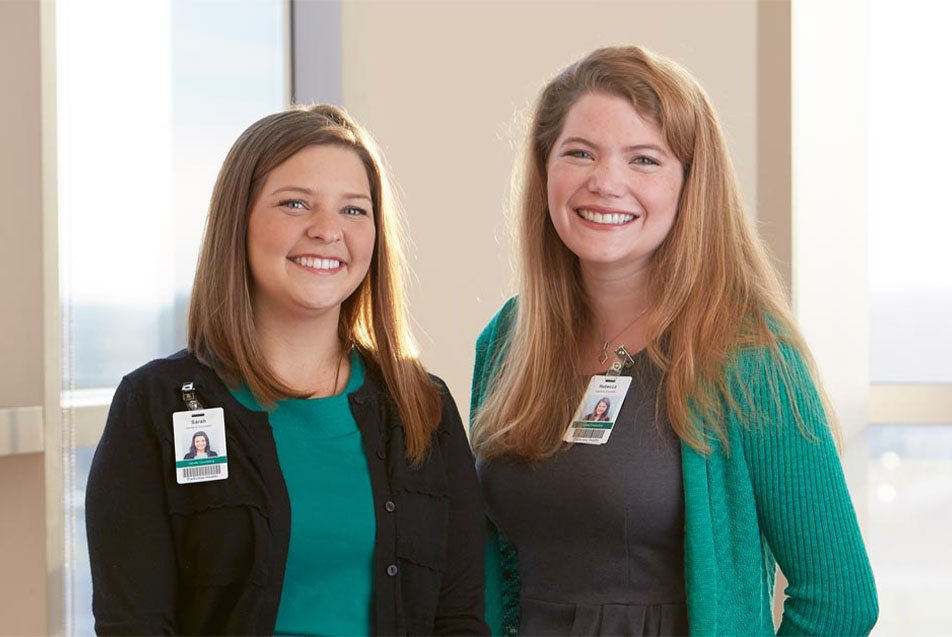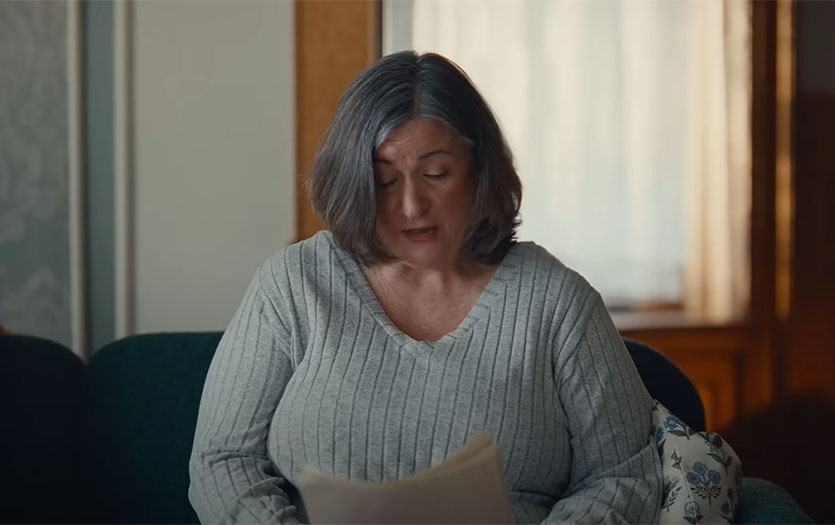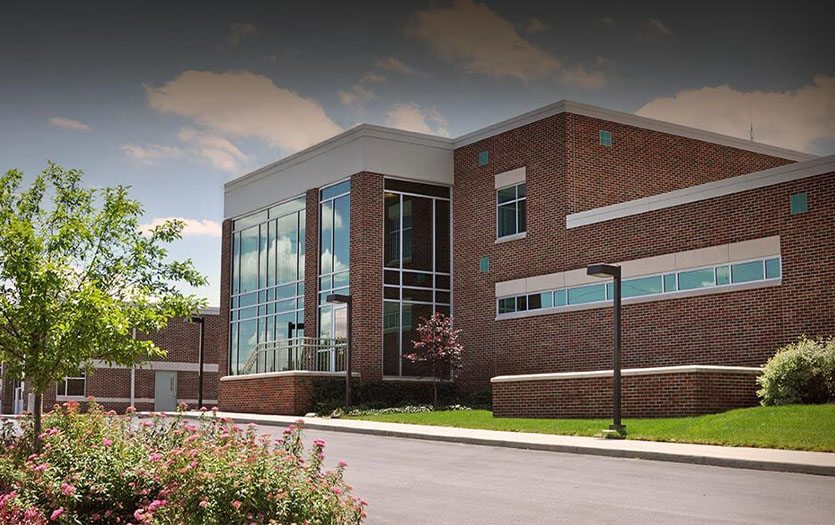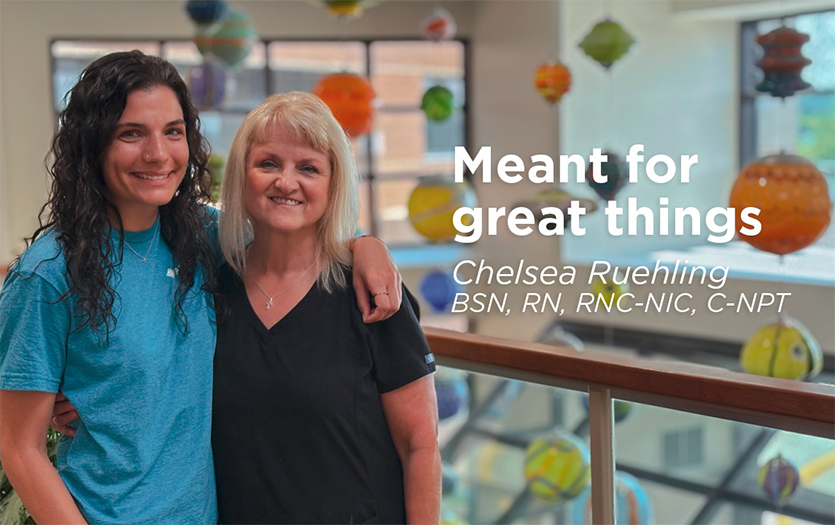

When we, or a loved one, receive a tough diagnosis, our first reaction is to assess and deal with the illness at hand. But once the dust settles and we’ve had some time to process, we often turn to what that diagnosis might mean for other members of the family. Genetic counseling provides vital information in our pursuit of those answers. Paired with the right genetic testing, people can be empowered to develop a treatment or prevention plan. At Parkview, if you’re seeking genetic insights, you will likely meet Sarah Brandenberger or Rebecca Nelson
With a mission of giving families knowledge and options so they can be informed decision makers, and a shared passion for impacting the future of healthcare, Sarah and Rebecca are two of the trailblazing, visionary, patient-focused People of Parkview.

[Pictured, left to right: Rebecca Nelson, Sarah Brandenberger]
Name:
Sarah Brandenberger, MS, CGC
Rebecca Nelson, MS, CGC
Official title:
Sarah: Certified Genetic Counselor
Rebecca: Certified Genetic Counselor
Describe your career journey:
Sarah: I completed my undergraduate degrees in Biology and Psychology at Indiana University and my graduate training at University of South Carolina. From there, I took a pediatric genetic counseling position at Spectrum Health in Grand Rapids, Mich., where I worked in general pediatrics, a fetal alcohol syndrome clinic, and a cystic fibrosis clinic. I started my work here at Parkview in December of 2014, as a cancer and cardiovascular genetic counselor. Next week, I will be transitioning into the role of prenatal genetic counselor.
Rebecca: I got my bachelor’s degree in Biology and Psychology (minor in French) from Bucknell University (2008-2012). Obtained my Masters of Science in Genetic Counseling from Case Western Reserve University (2012-2014). Began as a cancer and prenatal genetic counselor at Parkview in June 2014.

Describe your current role and daily responsibilities in detail:
Sarah: I provide accurate risk assessment, serve as an interpreter to explain complex medical information in simple ways and provide an unbiased review of the array of genetic testing options. We also develop custom screening and cancer prevention options. We try to make complex genetic test results easy to understand and go above and beyond for our patients to assure the genetic information given is the most up to date.
Rebecca: There are four main components of genetic counseling: risk assessment, education, facilitated and informed decision making, and testing interpretation. During a genetic counseling session, I review the patient’s personal and family history and discuss why the history is or is not concerning for a hereditary cause of cancer. If indicated, we discuss the available genetic testing, highlighting certain hereditary cancer syndromes and reviewing the associated cancer risks, screening, and prevention options. I help the patient determine which genetic test is best for their case and for their goals (what do they want to know, what do they not want to know).
Once results are back, we discuss what the genetic testing found, and what that means for the patient and their family members. For patients that carry a hereditary cancer mutation, I review the cancer syndrome and management options. We discuss how the patient is going to give their family this information (as genetic testing affects the whole family), and I provide information for community and national support groups. For patients that do not carry a hereditary mutation, I am able to estimate cancer risks (if any) from the family history, and provide personalized cancer screening recommendations.
Behind the scenes I work with insurance companies to make sure that the testing that is recommended will be covered by the patient’s insurance. Genetic testing without insurance coverage can be hundreds or even thousands of dollars. On the other hand, if someone meets their insurance criteria genetic testing is typically less than $100.
I also sit on multiple cancer committees and tumor site teams, alongside many other health care providers. Depending on the meeting we may discuss individual cases and treatment options or system wide processes for cancer screening, diagnosis, treatment, and long-term surveillance.
How did you discover this specialty?
Sarah: A friend in my sorority at IU recommended genetic counseling, as it fit perfectly with my current degree path of psychology and biology. I was hooked instantly.
Rebecca: My first course in genetics was in my 9th grade biology class. I was, for lack of a better term, instantly smitten. I was that awful kid who asked for additional genetics homework. I spent my free time reading about various genetic conditions, doodling punnett squares, and constructing family trees. My biology teacher mentioned genetic counseling in a long list of genetics professions and it was career love at first sight.

What sort of difference do you hope to make for people?
Sarah: I want to make a difference in the lives of the families I see. For some, they think illness or diseases, such as cancer, are inevitable. They think their health is out of their control. I hope to give my patients the tools to see that they can be proactive with their health. Genetic test results really open more doors to better prevention, specialized treatments and earlier interventions. It can save lives and change how people see their family tree and personal risks.
Rebecca: I hope to provide explanations and education. The two most common questions I’m asked are, “Why was I diagnosed with cancer?” and “What’s the chance that this could happen again?” Genetic testing aims to answer those questions, genetic counseling provides education about the hereditary cause so the patient not only understands their risks and medical recommendations, but also feels comfortable relaying this information to their family members.
What is your favorite part of your day-to-day routine, and why?
Sarah: Seeing patients for sure! And getting “interesting case” calls from fellow providers and physicians.
Rebecca: I love answering random genetics questions from patients and health care providers. It allows me to help others better understand genetics and occasionally sparks research projects.
What moment would you count as your greatest success in this position?
Sarah: I started the new CV Genetics Clinic in cardiology. There were a lot of logistical issues and billing solutions with this clinic, so it was great to see all of it completed.
Rebecca: I organized Fort Wayne’s first ever 22q at the Zoo event, an international day for people and families with 22q11.2 deletion syndrome. We had our second annual event this year at the Fort Wayne Children’s Zoo and hope to keep growing the awareness day!

What’s something you hope to accomplish in your career?
Sarah: I was just published, so that was a big one on the bucket list. I am currently transitioning into the arena of prenatal. Thus far, Parkview has never had a full-time prenatal GC, so I hope to really improve and encourage genetics education in that area. I am very excited about the opportunities this will bring.
Rebecca: Genetic counseling is fairly accessible in the United States. Most other nations are not as fortunate. I would love to volunteer for a quasi “genetics without boarders” program. Operation Smile works internationally with children that have a cleft lip/palate, which can be hereditary. They’re currently not looking for genetic counselors, but I’d love to make a case for one in the future.
What might surprise people about genetic counseling?
Sarah: Designer babies are not part of my job description. Nor are we able to test for or prevent all disease. We also do not “make” anyone do genetic testing. We are all about making the best choices based on a family’s personal beliefs. I am here to promote health and awareness in families. If we know what is going on in a family to cause illness, there could be options to help better treat the condition. This could mean increasing breast cancer screening for women at high risk for breast cancer or making sure a baby with Down syndrome is delivered at PRMC since we can offer a higher level NICU and better care for not only baby, but mom, too. Many of my best sessions are ones where I feel like a made a difference in a family, or someone has an “ah ha” moment. Usually, this comes when people think illness and disease are completely out of their control but then they learn there are ways they can take action.
Rebecca: Just because you have genetic counseling does not mean you have to have genetic testing. Genetic counseling is more about identifying the appropriate test (if any) and letting you decide if testing is right for you. It’s okay to not want to know your genetic risks.
How can genetic counseling change a patient’s care or treatment plan?
Sarah: As medicine and what we know about genetics grows, so too does their impact on a person’s care. Some women who have breast cancer may opt to have more aggressive surgery to prevent a future breast cancer. Screening for other types of cancers can be important as well. In prenatal, some women may need to deliver a baby with a rare genetic condition at a hospital with a more specialized NICU to allow the best care for the baby. In many of my cases, I tell patients that there are guidelines for routine patient care. But we also tailor patient care to assure the best outcomes, based on genetics.
Rebecca: Through genetic counseling we are able to tailor one’s cancer screening or risk reduction plan based on their genetic testing results and/or personal and family history. For example, they may qualify for annual breast MRI, more frequent colonoscopies, or preventative surgeries such as a prophylactic mastectomy. There are also select cancer treatments that work better or worse for patients who have certain hereditary cancer syndromes.
What’s something people would be surprised to know about you?
Sarah: I used to ride horses competitively. I am also a huge car person. And yes, I have had genetic testing.
Rebecca: I’ve recently become involved with the musical theater scene in Fort Wayne. This year I was Ensemble Woman #6 in Young Frankenstein and Ruben’s Wife/Egyptian Cow in Joseph and the Amazing Technicolor Dreamcoat.
What is your favorite thing to do outside of work?
Sarah: Shopping or gardening. I also spend a lot of time with my growing chicken flock.

Rebecca: I’m a part of Fort Wayne Sport and Social, a year round sports league. We’ve played kickball, dodgeball, volleyball, wallyball, and flag football. I’m not particularly good at sports, but my teammates have become some of my closest friends.

If you could tell people to read one book in their lifetime, which would it be?
Sarah: “Total Money Makeover” by Dave Ramsey, because I have become a financial nerd.
Rebecca: Okay, full warning; this is a young adult series aimed towards teenage girls – “The Selection Series” by Kiera Cass. It’s impossible to put it down. Even my mom loved it! Think of the Hunger Games meets the Bachelor (minus the fight to the death part).

What would we find on your bucket list and what do you plan to check off next?
Sarah: Scuba dive on the Great Barrier Reef.
Rebecca: I inherited a love for music from my dad, but for some unknown reason, we’ve never attended a concert together. We have a list of bands including Imagine Dragons, OneRepublic, and Fall Out Boy. Next time a tour stops at Red Rocks Amphitheater (near my hometown in Colorado), we’re there.
How do you like to unwind?
Sarah: On the couch, with my two dogs, a beer and HGTV.
Rebecca: I enjoy running … scratch that, running is hard, but I like the open road and the health benefits. My two best friends from college and I are trying to coordinate a half marathon weekend, so I need to be ready to keep up with them.

A physician referral (typically from a family physician, OB/GYN or oncologist) is preferred when scheduling a Genetic Counseling appointment. Patients can call (260) 266-9225) to learn more about the process and how to obtain a referral.



